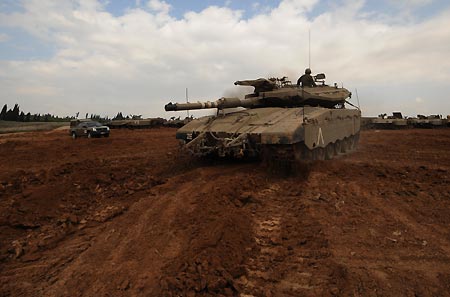Israel on Wednesday rejected a French proposal for a temporary ceasefire in the Hamas-ruled Gaza Strip, insisting on continuing the ongoing offensive in the devastated enclave.
Israel "did not launch the Gaza offensive only to end it while the rocket fire remains unchanged," Prime Minister Ehud Olmert was quoted by local news service Ynet as saying at a cabinet meeting, while stressing that "we've been restraining ourselves for years and Israel gave the lull a fair chance."
 |
|
An Israeli tank runs in southern Israel bordering the Gaza Strip Dec. 29, 2008. Israel rejected French proposal for 48-hour ceasefire on Wednesday and decided to continue its offensive on the ongoing offensive at the Hamas-ruled Gaza Strip, on Dec. 31, 2008. |
Commenting on a possible ceasefire, the premier said that if the right conditions present themselves, which "we feel would guarantee better security realities in the south," Israel will be willing to consider it. "But we're not there yet," he added.
However, following a presentation by defense officials, the Israeli cabinet on Wednesday decided to reject the 48-hour humanitarian ceasefire plan proposed by France, which holds the rotating presidency of the European Union till Thursday, and instead to continue what is code-named Operation Cast Lead.
Noting that the French initiative "contained no guarantees of any kind that Hamas will stop the rockets and smuggling," Foreign Ministry spokesman Yigal Palmor said that "it is not realistic to expect Israel to cease fire unilaterally with no mechanism to enforce the cessation of shooting and terror from Hamas."
"Giving Hamas a respite just to regroup and rearm is a mistake. The pressure on the Hamas military machine must continue," echoed Olmert's spokesman Mark Regev.
So far since last Saturday, Israel kicked off the aerial assaults against Hamas targets, leaving more than 390 Palestinians were killed and some 1,900 wounded. The attack generated a chorus of international condemnation and calls for an immediate end to the bloodshed.
Olmert vowed on Wednesday that Israel would not conclude its operation until all of its goals have been reached. While Israeli officials are speaking in different voices on whether to topple Hamas, they commonly agree that the campaign should deal Hamas a serious blow and put an end to the continuing rocket fire at southern Israel, and thus establish a new security environment in the southern land.
The Gaza ruler has sustained significant damage, and its operatives have hidden out in hospitals and mosques, said the Shin Bet security agency, noting that "Hamas has been attacked like it has never been attacked before."
On Wednesday evening, the Israel Air Force bombed a mosque in southern Gaza, which it said Hamas had used to store part of its rocket arsenal. Earlier in the day, Israeli warplanes struck a tunnel network under the Gaza-Egypt border, and among other targets was an office of Hamas leader Ismail Haneya.
Despite Israel's devastating air raids, Gazan militants continued their retaliatory barrage Wednesday, firing at least 60 rockets and mortar shells at southern Israel with a range of about 40 kilometers. Since Saturday, the rocket attacks have caused four deaths and over a dozen injuries on the Israeli side.
No final word has been given on whether or when the Jewish state would launch a ground maneuver. Israeli leaders have repeatedly stressed that should it be found necessary, the army would carry out a ground operation. Preparations for such a scenario have reportedly completed, with infantry troops and armored units waiting along the border.
In efforts to ease the humanitarian concerns of the international community, Israel on Wednesday allowed over 100 truckloads of humanitarian supplies into the impoverished strip with a population of some 1.5 million, adding to the some 100 truckloads on Tuesday, according to local daily Ha'aretz.
(Xinhua News Agency January 1, 2009)